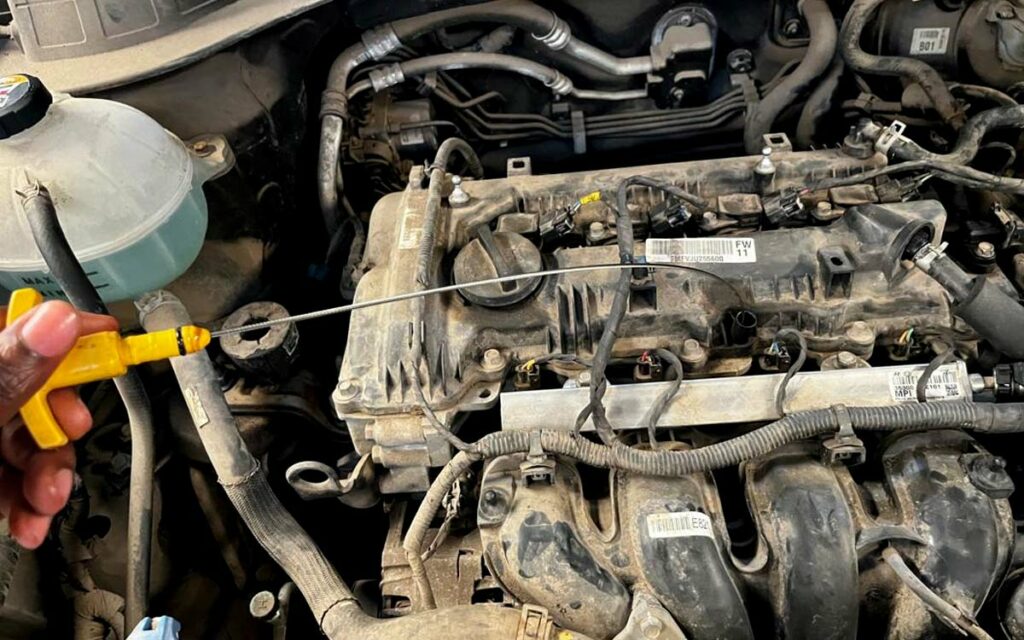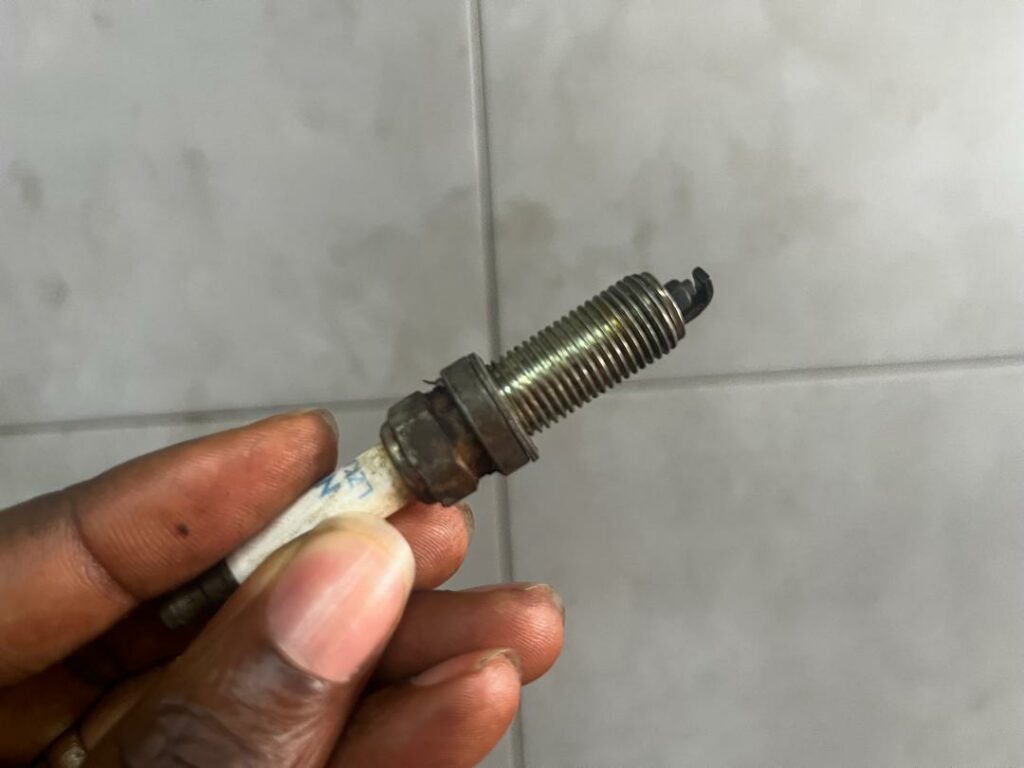Trouble Accelerating After an Oil Change? (Causes & Solutions)


If your car is suddenly struggling to accelerate after an oil change, you might be wondering why this sudden shift in performance has occurred. A variety of issues can cause this so it’s important to understand the potential underlying issues so you can get your vehicle back into top-notch condition and keep it running strong.
In this article, we’ll talk about why your car could be having trouble accelerating after an oil change, as well as other causes of trouble, and provide tips on how to avoid future problems.
Reasons Why Your Car is Having Trouble Accelerating After an Oil Change
There are a couple of reasons why your car could be having trouble accelerating after an oil change. These include:
- Poor Quality oil
- Clogged oil filter
- Loose Drain Plug
Let’s explore this in detail:
1. Poor Quality Oil
The first reason why your car may have trouble accelerating after an oil change is using the wrong type of oil. Different vehicles require different types and weights of oil for optimal performance, so it’s important to use the correct type for your particular make and model.
Always make sure to check with a certified technician before changing the oil in your car. Additionally, I would advise you to have your oil changed at a reputable auto shop or dealership to ensure that the correct type of oil is used.

There was a time when I changed my car’s oil myself and used a cheap type of oil because I was low on cash, After driving for a couple of miles I realized my car wasn’t accelerating. Needless to say, it was a costly mistake that I won’t be making again!
2. Clogging Oil Filter
Another common reason why your car may be having trouble accelerating after an oil change. The oil filter should be changed each time you have your oil changed, as it acts as a barrier to dirt and debris that can clog the engine. If the filter isn’t replaced, then these contaminants can make their way into the engine and cause issues with performance or even damage over the long term.
To keep your car running smoothly, it’s important to make sure that you change the oil filter each time you get an oil change and use a high-quality filter that is designed for your vehicle.
3. Loose Drain Plug
Again, one thing to check is the oil drain plug. If it is not securely tightened, then you could have a leak that is reducing the amount of oil available for your car’s engine. This lack of lubrication can lead to decreased acceleration and even damage to the engine over time.
My wife had a similar problem after she got her car serviced at the local auto shop. It turned out that they hadn’t tightened the drain plug correctly and it was leaking oil, leading to reduced performance and even an engine warning light. After we had a certified mechanic check it out and tighten the drain plug, everything was back to normal with no further issues.
4. Leaking Oil Pan Gasket
Finally, a leaking oil gasket can also be a cause of difficulty accelerating. The oil pan gasket helps to keep the oil in your engine from leaking out. If it’s damaged or worn, then it won’t be able to do its job properly and that can lead to problems with acceleration.
A good mechanic should be able to inspect the oil pan gasket and replace it if necessary. This can help to ensure that your engine is getting the oil it needs and doesn’t experience any problems with acceleration.
No matter what your oil change routine is, make sure to pay attention to any signs that something may be wrong. If you start noticing decreased performance or other issues related to oil levels, then take the time to get it checked out by a professional and avoid costly problems in the future. Taking care of our cars can save us a lot of money down the road!
Now that you know the reasons why your car is having trouble accelerating after changing the engine oil, let’s discuss the other reasons why your car is having trouble accelerating and how best to fix it.
Other Reasons Why Your Car Won’t Accelerate
- Leaking or clogged fuel injectors
Let’s explore these in detail
1. Leaking or Clogged Fuel Injectors
Fuel injectors are a critical component of any modern engine, and if they become clogged or malfunctioning, your car may have difficulty accelerating. Fuel injectors are responsible for delivering a precise amount of fuel to the engine to ensure that it runs efficiently. If this isn’t happening correctly, then your car will struggle to accelerate properly.
If you suspect there is an issue with your fuel injectors, it’s best to take your vehicle to an experienced mechanic for further diagnosis and repair. They will be able to determine if the injectors are indeed causing the issue, or if there is something else at fault.
2. Oxygen Sensor Crash
Again, this is another common reason why your car may have trouble accelerating after an oil change. The oxygen sensor is a very important part of the engine that helps regulate fuel and air to improve the performance of the vehicle. If there is an issue with the oxygen sensor, it can cause poor acceleration, or even stalling issues.
Oxygen sensor crash is mostly caused by dirt and debris buildup in the engine, which can happen over time. It’s important to regularly have your car checked by a technician to make sure that all parts are working correctly. Additionally, regular maintenance such as oil changes can help prevent oxygen sensor crashes.
3. Ignition Problems
Ignition problems can cause common cause of poor acceleration after an oil change. Issues with the ignition system can cause your car to hesitate or even stall when you try to accelerate, as well as cause issues such as rough idling.
Ignition problems are often caused by dirty spark plugs or faulty wiring. Cleaning the spark plugs and checking for any loose connections in the wiring should help to resolve this issue. Additionally, having a technician inspect the ignition system to make sure everything is working properly can also help prevent issues with acceleration.
4. Faulty Spark Plugs
Another problem might be because of faulty spark plugs, Spark plugs serve as a bridge between the ignition coil and your engine cylinders, providing the spark needed for combustion in your engine. If spark plugs are worn or damaged, they won’t be able to do their job correctly and that can lead to difficulty accelerating.
Replace the spark plugs regularly to ensure that they don’t become a problem for your engine. If you notice any acceleration issues, then it’s worth having a mechanic take a look at the spark plugs to see if they need replacing.

Broken Timing Belt
Broken timing belts can also cause difficulty accelerating. A timing belt is responsible for keeping the camshaft and crankshaft in sync so that the engine runs smoothly. If a timing belt breaks, it can cause your car to stall or hesitate when you go to accelerate.
Have your timing belt inspected regularly by a mechanic to make sure that it is in good condition. If the timing belt is worn or damaged, it should be replaced as soon as possible to ensure that it doesn’t cause any issues with acceleration.
Faulty Air intake system
Another reason that I know can cause low acceleration is because of a faulty air intake system. This system is responsible for delivering the air needed to ignite fuel in the engine and create power. If there’s a problem with this system, it can lead to decreased acceleration because the engine won’t be able to produce enough power.
5. Low Tire Pressure
Finally, low tire pressure can be a cause of difficulty accelerating. When your tire pressure is too low, it can make it much harder for your engine to move the car forward and you will notice that it takes more time or effort to get up to speed.
You might think your car isn’t accelerating because of a serious issue when in fact, the issue is with your tires. Check your tire pressure regularly and fill them up when they’re low to ensure that you don’t experience any issues while driving.
Remember, if you are having difficulty accelerating it could be caused by a variety of different things. Pay attention to how your car is performing and get it looked at by a mechanic if you think something is wrong. Taking care of any issues as soon as they arise can help prevent costly repairs in the future and keep your car running smoothly.
Final Thought
It’s important to take precautions when it comes to keeping your car running smoothly. A good maintenance routine can help ensure that your car isn’t suffering from any of the issues listed above and keep you safe on the road. Regularly check oil levels, tire pressure, and other components of your vehicle to make sure everything is in good condition. Doing so can save you time, money, and lots of headaches in the long run!
If there’s ever something you’re unsure of while inspecting your car, don’t hesitate to contact a local mechanic for advice. A good mechanic will be able to diagnose any issues and help you find the best solutions to keep your car running like new!
It’s also important to make sure that your insurance policy is up-to-date in case anything unexpected happens on the road. You never know when something might happen, so being prepared and covered can give you the peace of mind to enjoy your drives!
Welcome to Motorsnitch, your trusted resource for diagnosing and fixing common car problems. Whether you are an experienced mechanic or a curious car owner, we provide clear and concience step-by-step guides to help you troubleshoot and repair your vehicle. Our mission is to empower you with the knowledge and confidence to keep your car running smoothly without unnecessary trips to the shop.
Recent Posts
Have you ever been driving down the road when suddenly your peaceful drive is interrupted by a loud, noise coming from under the hood? You instantly have a feeling that something is terribly wrong.
Have you ever felt that terrifying moment when your engine starts to shake especially in a traffic jam or when you stop? Be calm because we’re about to spill the beans on the truth behind the engine.
About Us
Motorsnitch is a multimedia internet platform that educates its web page visitors about everything cars and everything with engines. We also make good product recommendations to our cherished readers. Motorsnitch aims to help as many people as possible with any engine-related issues or questions.
LEGAL INFORMATION
This site is a participant in the Amazon Services LLC Associates Program, an affiliate advertising program designed to provide a means for sites to earn advertising fees by advertising and linking to Amazon.com. We are compensated for referring traffic and business to Amazon and other companies linked to on this site.
- Disclaimer
- Privacy Policy
- Terms And Conditions
- About GIDEON BAFFOUR ANSAH
- Sitemap
https://motorsnitch.com/why-is-my-car-having-trouble-accelerating-after-an-oil-change/



